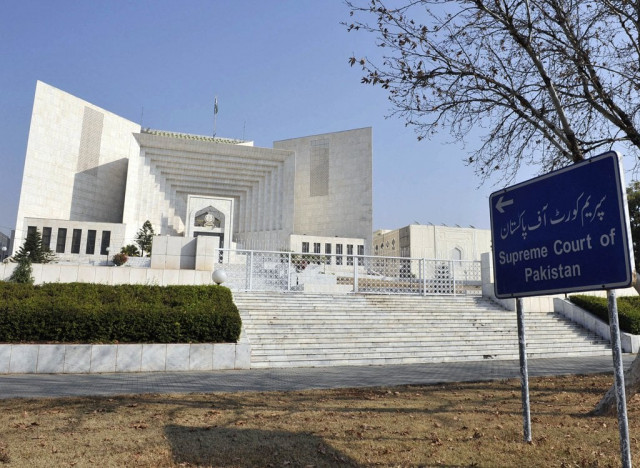Plea in SC for live broadcast of court proceedings
Per the petition live streaming of Supreme Court proceedings will enable wider access to judicial proceedings

Supreme Court of Pakistan. PHOTO: AFP
Raheel Kamran Sheikh filed a constitution petition under Article 184 (3) of the Constitution and asked the federal government, the Pakistan Electronic Media Regulatory Authority (PEMRA), the Supreme Court registrar, and the law and information ministries' secretaries to respond to the petition.
The petitioner requested the SC to issue appropriate directions to respondents for broadcasting SC proceedings, particularly suo motu actions which are taken under Article 184 of the Constitution for the enforcement of fundamental rights guaranteed by Articles 9, 10A, 19A, and Article 25 of the Constitution of the Islamic Republic of Pakistan, 1973.
Sheikh also prayed to the court to declare that if a ban is imposed on the live streaming of Supreme Court proceedings, it will be considered arbitrary and discriminatory in nature. Moreover, prohibition will be considered a violation of the fundamental rights of the citizens, including the right of access to justice, the right to information and the right to fair trial and due processes.
Sheikh also asked the SC ordered the preparation of guidelines when restrictions on live steaming or broadcasting could be placed in case of exceptional circumstances that should be in line with public interest.
Per the petition, live streaming or broadcasting of the Supreme Court proceedings in matters of public importance will enable litigants and society, particularly the educated ones, to have wider access to judicial proceedings.
"Live streaming will effectuate the public's right to know, and that too with radical immediacy while reducing the public's reliance on second-hand narratives," the petition read.
It added that the move will enable those affected by the decisions of the Court to be aware of the manner in which judicial decisions are made. In this way, those affected – and the society at large – will be able to view court proceedings first hand so that they will be able to form informed and educated opinions about the functioning of courts.
"The process will help reduce misinformation and misunderstanding about the judicial process," the petition further said, adding that apart from being educational for the public, the practice will also benefit law students who will be able to observe and learn from the interactions between the Bar and the Bench.
"The archives will constitute a rich source of knowledge for aspiring advocates and academics to study legal advocacy procedures, interpretation of law, and oratory skills, amongst other things. It will further promote research into institutional functioning of the courts."
The petition also stated that live streaming and broadcasting of court proceedings will also allow courts to have a wider outreach across the country. The practice will also remove the traditional physical barriers which the public faces when it comes to viewing court proceedings.
The practice will also help keeping courts less crowded and will also reduce the need for litigants to travel long distances to observe the proceedings in their cases.
The applicant contended that Article 19A of the Constitution itself guarantees the right to information in all matters of public importance. Such a fundamental right is only subject to reasonable restrictions imposed by law. However, neither any restriction has been imposed by law to prohibit live streaming of the Supreme Court proceedings nor there exists any such laws that could impose blanket prohibition on the practice.
The petitioner stated that right to information contained within Article 19A of the Constitution cannot be realized to the extent of judicial proceedings in the most interactive and educationally wholesome manner until and unless courtroom proceedings of this court are made available beyond the physical confines of the Court.
Sheikh contended that live streaming and broadcasting of the proceedings of SC in all matters of public importance shall guarantee that in no case, the fundamental right to fair trial and due process, as embodied in Article 10A of the constitution, is violated. This will invariably enhance legitimacy of the court and supplement public confidence in the judicial process
Sheikh also said that the practice will enhance the rule of law and promote better understanding of legal governance as part of the functioning of democracy. Likewise, it will help reinforce the rule of law, ensure the upholding of the principle of open, transparent and accessible justice, and the legitimacy and effectiveness of the court, and enhance public confidence in the institution of the judiciary.
The petitioner also stated that any blanket ban or prohibition on the live streaming of the proceedings in the SC would be considered arbitrary and discriminatory. And if prohibitions will be imposed, then the same should apply to the practice of carrying mobile phones, pagers and cameras in courtrooms per Articles 4 and 25 of the Constitution.



















COMMENTS
Comments are moderated and generally will be posted if they are on-topic and not abusive.
For more information, please see our Comments FAQ